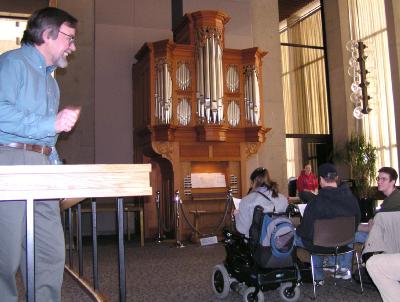April 10, 2003
‘Basic Problem’ posed by scientific advances worries physicist
In Vladi Chaloupka’s worldview we are living, quite precariously, on one small spark.
The UW physicist compares the Big Bang to a bonfire. Today the fire has cooled, mostly hot coals and no flames remain. But occasionally a spark shoots into the air. In that small spark, he says, is an entire civilization — our civilization, the Stone Age, the Greeks, Jesus, Hitler, Einstein, UW employees and the Metro bus drivers who delivered many of them to campus today.
“It may well be a law of nature that a civilization that discovers tools that are too powerful for its own good will simply kill itself,” Chaloupka said. “It may well be, but we don’t know and therefore the proposition is that since, in this spark that belongs to us right now, we have produced so many beautiful things — Mozart and Bach and Aristotle and Einstein — it would be a crime if we foolishly extinguished our spark too soon.”
His premise, which he calls the “Basic Problem,” is that scientific and technical knowledge is advancing exponentially while human beings’ ability to deal with those advances hasn’t progressed much since ancient Greece. In fact, considering the 20th century was the bloodiest on record, some would say we’re regressing, that our spark is already dimming.
“The basic problem is the gap between the cumulative, exponential progress in science and technology on the one hand, and the lack of comparable progress in ethics, civility and the ability to use technology thoughtfully and responsibly,” he said.
Science, he says, may have opened a Pandora’s box, not just with nuclear weapons, but more recently with nanosciences like biotechnology, which give individuals and small groups the power to discreetly produce dangerous materials. The phenomenon has been called knowledge-enabled mass destruction. For an example, he points to the group of scientists that, last summer, published a paper documenting how easy it was for them to create a strain of the polio virus.
So Chaloupka, who in addition to his faculty position in physics has an adjunct appointment in music, would like to see more research emphasizing risk assessment and unintended consequences. He envisions the day when institutions like the UW have a well-funded Department of Foresight or, perhaps, a Department of Common Sense.
As it is, greed, he says, often gets in the way of a common-sense approach. When Chaloupka refers to greed, he speaks of individuals’ generalized greed for happiness, for the long and healthy lives that science promises.
“It’s like we are going downhill and going faster and faster and we hope there will be no problems,” he said. “If you say, ‘Well, I want to slow down a little bit,’ people ask ‘Why? Why do you want to slow down?’ Why? Because, for example, music and physics. The cumulative accomplishments of our species are too valuable to be threatened by annihilation.”
Chaloupka plays Bach fugues on the pipe organ in his free time, and likes to include music in his lectures on just about any subject, but especially when he talks about the Basic Problem. He explains how music, Johann Sebastian Bach’s music, at least, is an example of emergent complexity, and how music has played an inspirational and motivational role throughout the history of science. And he loves to tell of the time he gave an all-Bach recital after a recent colloquium at the College of William and Mary on a pipe organ that was installed in 1740 — when the great composer was still living.
For Chaloupka music serves as a reminder that science doesn’t have all the answers. Music, then, tempers his enthusiasm for science with a great deal of humility. It reminds him that science is fallible, that it could cause and has caused great harm.
So what’s a scientist to do? Three things, according to Chaloupka, beginning with education.
“People who recognize the problem should teach about it,” he said. “We cannot find a solution unless people are aware of the existence of the problem. Then they’ll start worrying about a solution.”
That’s why Chaloupka speaks on the danger of unbridled scientific advancement whenever he gets the chance. He frequently gives public lectures on campus and he regularly talks at institutions across the nation as well. He even designed some undergraduate and graduate courses dealing with the topic.
Second, we need to do more research emphasizing risk assessment and foresight. This will slow down research in the process, but the more restrained approach could save us in the long run, he says.
Finally, he says, we need to strengthen the rule of law in the international domain. This is crucial if we are to guard against small pockets of the world society holding the rest of the population hostage with so-called “knowledge-enabled mass destruction.”
But creating such a strong international body is a task the Bush administration, Chaloupka fears, is ill equipped to handle. The go-it-alone approach the U.S. has taken toward Iraq, he says, is a huge mistake.
“We should have taken all the potential for good that existed after September 11 and rebuilt the United Nations. And what are we doing instead? We are making the U.N. irrelevant.”
Chaloupka teaches Physics of Music this quarter, and he will open his classroom to the campus community on April 23 as part of the UW’s Day of Reflection. During the lecture — entitled “War on Iraq: Beyond Hawks vs. Peaceniks” — he will explain the connection of his ideas to current events and he even promises to bring music into the discussion. A synopsis of the lecture can be found at www.phys.washington.edu/~vladi/iraq.html.
The class meets at 2:30 p.m. in the Geballe Auditorium, 102 Physics/Astronomy.



